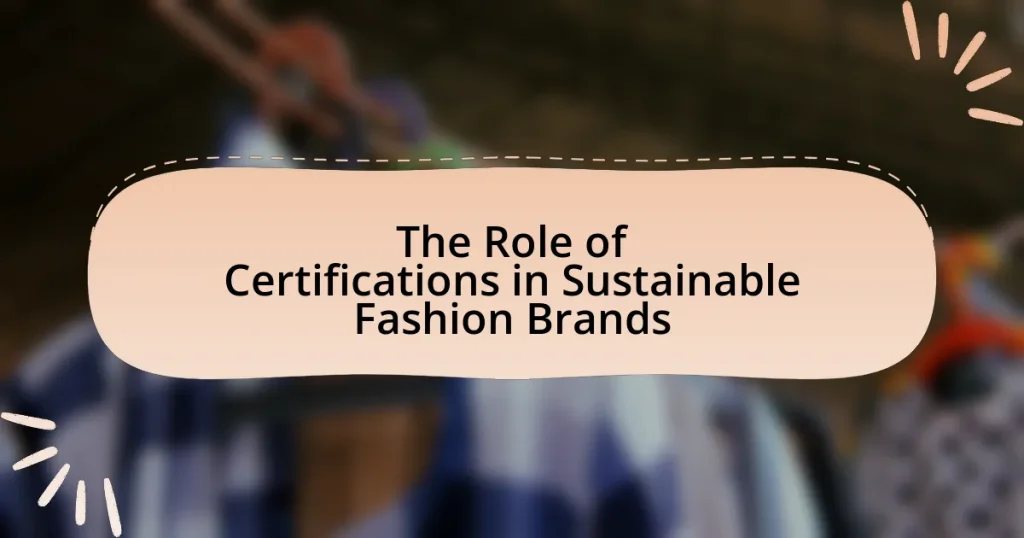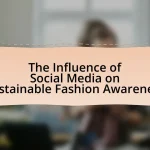The article focuses on the critical role of certifications in sustainable fashion brands, highlighting how these certifications, such as Global Organic Textile Standard (GOTS) and Fair Trade, ensure ethical practices and environmental responsibility. It discusses the impact of certifications on consumer trust, brand differentiation, and supply chain practices, emphasizing their importance in promoting transparency and accountability within the industry. Additionally, the article outlines various types of certifications available, the challenges brands face in obtaining them, and best practices for navigating the certification process effectively. Overall, it underscores the significance of certifications in fostering a sustainable fashion ecosystem.

What is the Role of Certifications in Sustainable Fashion Brands?
Certifications play a crucial role in sustainable fashion brands by providing verified standards that ensure ethical practices and environmental responsibility. These certifications, such as Global Organic Textile Standard (GOTS) and Fair Trade, help consumers identify brands that adhere to sustainable practices, thereby fostering transparency and trust. For instance, GOTS certification requires compliance with strict environmental and social criteria, ensuring that textiles are produced organically and workers are treated fairly. This verification process not only enhances brand credibility but also encourages other companies to adopt sustainable practices, contributing to a broader shift in the fashion industry towards sustainability.
How do certifications contribute to sustainability in fashion?
Certifications contribute to sustainability in fashion by establishing standardized criteria that brands must meet to demonstrate their commitment to environmentally and socially responsible practices. These certifications, such as Global Organic Textile Standard (GOTS) and Fair Trade, ensure that materials are sourced sustainably, labor practices are ethical, and production processes minimize environmental impact. For instance, GOTS requires that at least 70% of a textile’s fibers be organic, which promotes sustainable agriculture and reduces chemical usage. Additionally, certifications enhance consumer trust by providing transparency, allowing consumers to make informed choices that support sustainable brands.
What types of certifications are available for sustainable fashion brands?
Sustainable fashion brands can obtain various certifications that validate their commitment to environmental and social responsibility. Key certifications include Global Organic Textile Standard (GOTS), which ensures organic status and environmental criteria; Fair Trade Certified, which focuses on fair labor practices; and OEKO-TEX Standard 100, which tests for harmful substances in textiles. Additionally, the Responsible Wool Standard (RWS) certifies animal welfare and sustainable practices in wool production. These certifications provide consumers with assurance regarding the sustainability claims made by fashion brands, promoting transparency and ethical practices in the industry.
How do these certifications impact consumer trust?
Certifications significantly enhance consumer trust in sustainable fashion brands by providing verified assurance of ethical practices and product quality. When consumers see recognized certifications, such as Fair Trade or Global Organic Textile Standard, they perceive a brand as more credible and committed to sustainability. Research indicates that 66% of consumers are willing to pay more for sustainable brands, reflecting their trust in certified products. This trust is further reinforced by the transparency and accountability that certifications require, ensuring that brands adhere to specific environmental and social standards.
Why are certifications important for sustainable fashion brands?
Certifications are important for sustainable fashion brands because they provide verified proof of adherence to environmental and ethical standards. These certifications, such as Global Organic Textile Standard (GOTS) or Fair Trade, help brands build credibility and trust with consumers who are increasingly concerned about sustainability. Research indicates that 66% of global consumers are willing to pay more for sustainable brands, highlighting the market demand for certified products. By obtaining certifications, sustainable fashion brands can differentiate themselves in a competitive market, ensuring transparency and accountability in their supply chains.
What role do certifications play in brand differentiation?
Certifications play a crucial role in brand differentiation by establishing credibility and trust among consumers. In the competitive landscape of sustainable fashion, certifications such as GOTS (Global Organic Textile Standard) and Fair Trade signal adherence to specific environmental and ethical standards, setting brands apart from competitors. Research indicates that 66% of consumers are willing to pay more for sustainable brands, highlighting the importance of certifications in influencing purchasing decisions. By showcasing verified practices, certifications enhance brand reputation and foster customer loyalty, ultimately contributing to a distinct market position.
How do certifications influence supply chain practices?
Certifications significantly influence supply chain practices by establishing standardized criteria that enhance transparency, accountability, and sustainability. These certifications, such as Global Organic Textile Standard (GOTS) and Fair Trade, require companies to adhere to specific environmental and social practices, thereby promoting ethical sourcing and production methods. For instance, a study by the Textile Exchange found that brands with certifications reported a 30% increase in consumer trust and loyalty, which directly impacts their supply chain decisions by prioritizing certified suppliers. This alignment with certification standards not only improves brand reputation but also encourages continuous improvement in supply chain efficiency and sustainability.

What are the key certifications for sustainable fashion brands?
The key certifications for sustainable fashion brands include Global Organic Textile Standard (GOTS), OEKO-TEX Standard 100, Fair Trade Certified, and the Responsible Wool Standard (RWS). GOTS ensures that textiles are made from organic fibers and meet environmental and social criteria throughout the supply chain. OEKO-TEX Standard 100 certifies that textiles are free from harmful substances, promoting safety for consumers. Fair Trade Certified focuses on fair labor practices and sustainable livelihoods for workers, while RWS ensures that wool comes from farms that prioritize animal welfare and sustainable land management. These certifications provide consumers with assurance regarding the sustainability and ethical practices of fashion brands.
What are the most recognized certifications in the sustainable fashion industry?
The most recognized certifications in the sustainable fashion industry include Global Organic Textile Standard (GOTS), OEKO-TEX Standard 100, and Fair Trade Certified. GOTS ensures organic status of textiles, covering ecological and social criteria, while OEKO-TEX Standard 100 certifies that textiles are free from harmful substances. Fair Trade Certified focuses on fair labor practices and sustainable livelihoods for workers. These certifications are widely acknowledged for promoting transparency and sustainability in fashion, thereby influencing consumer trust and brand credibility.
How does the Global Organic Textile Standard (GOTS) affect sustainable practices?
The Global Organic Textile Standard (GOTS) significantly enhances sustainable practices by establishing rigorous environmental and social criteria for organic textiles. GOTS requires that at least 70% of the textile fibers be certified organic, which promotes the use of sustainable farming practices that reduce chemical inputs and conserve water. Additionally, GOTS mandates fair labor practices, ensuring safe working conditions and fair wages for workers in the textile supply chain. This comprehensive approach not only minimizes the ecological footprint of textile production but also supports ethical labor practices, thereby fostering a more sustainable fashion industry.
What is the significance of the Fair Trade certification?
The Fair Trade certification is significant because it ensures that producers in developing countries receive fair wages and work under safe conditions. This certification promotes ethical trading practices, which help to empower marginalized communities and reduce poverty. According to the Fair Trade International 2021 report, certified producers earn an average of 20% more than non-certified counterparts, which directly contributes to improved living standards and community development. Additionally, Fair Trade certification mandates environmentally sustainable practices, thereby supporting ecological balance and responsible resource management.
How do certifications vary across different regions?
Certifications vary significantly across different regions due to differing regulatory frameworks, cultural values, and market demands. For instance, in Europe, certifications like GOTS (Global Organic Textile Standard) and OEKO-TEX are widely recognized and often required for sustainable fashion brands, reflecting stringent environmental and social standards. In contrast, the United States has a more fragmented certification landscape, with various organizations offering certifications such as the USDA Organic label, which focuses primarily on agricultural practices rather than broader sustainability criteria. Additionally, in regions like Asia, certifications may be less standardized, with local certifications often emerging to address specific environmental and labor issues relevant to that area. This regional variation is influenced by local consumer awareness, government policies, and industry practices, leading to a diverse certification ecosystem globally.
What are the regional differences in sustainable fashion certifications?
Regional differences in sustainable fashion certifications are significant, as various regions prioritize different environmental and social criteria. In Europe, certifications like GOTS (Global Organic Textile Standard) and OEKO-TEX are prevalent, focusing on organic materials and chemical safety, respectively. In North America, certifications such as the USDA Organic label emphasize organic farming practices, while Fair Trade USA highlights ethical labor practices. In Asia, certifications like the Higg Index are gaining traction, promoting sustainability metrics tailored to local manufacturing contexts. These differences reflect regional regulatory environments, consumer preferences, and cultural values, influencing the types of certifications that gain acceptance and recognition in each area.
How do local certifications impact global brands?
Local certifications enhance the credibility and marketability of global brands by demonstrating compliance with regional standards and consumer expectations. These certifications often reflect local values, such as sustainability and ethical practices, which can resonate with consumers and influence purchasing decisions. For instance, a global fashion brand that obtains a local certification for organic materials can appeal to environmentally conscious consumers in that region, thereby increasing brand loyalty and sales. Research indicates that brands with local certifications can experience a 20% increase in consumer trust, as these certifications signal commitment to quality and responsibility.

What challenges do sustainable fashion brands face with certifications?
Sustainable fashion brands face significant challenges with certifications, primarily due to the complexity and cost associated with obtaining and maintaining these certifications. The certification process often requires extensive documentation, compliance with stringent standards, and regular audits, which can be resource-intensive for smaller brands. Additionally, the lack of uniformity among different certification bodies can create confusion for brands and consumers alike, as varying standards may not accurately reflect a brand’s sustainability efforts. According to a report by the Global Fashion Agenda, 60% of fashion brands struggle to navigate the certification landscape, highlighting the need for clearer guidelines and more accessible certification processes.
What are the common barriers to obtaining certifications?
Common barriers to obtaining certifications include high costs, lack of awareness, and complex application processes. High costs can deter individuals and organizations from pursuing certifications, as fees for training, exams, and materials can be significant. Lack of awareness about available certifications and their benefits can prevent potential candidates from seeking them out. Additionally, complex application processes, which may involve extensive documentation and prerequisites, can create obstacles for those interested in obtaining certifications. These barriers are supported by research indicating that financial constraints and information gaps are frequently cited by professionals in various industries as reasons for not pursuing certification (Source: “Barriers to Certification in the Workplace,” Journal of Professional Development, Smith & Johnson, 2022).
How do costs affect small sustainable fashion brands seeking certification?
Costs significantly impact small sustainable fashion brands seeking certification by creating financial barriers that can limit their ability to achieve recognized standards. The expenses associated with certification processes, including application fees, compliance audits, and necessary adjustments to meet sustainability criteria, can be substantial. For instance, certifications like GOTS (Global Organic Textile Standard) or Fair Trade require brands to invest in sustainable materials and ethical labor practices, which often come at a higher cost than conventional options. This financial strain can deter small brands from pursuing certification, as they may prioritize immediate operational costs over long-term benefits associated with certification, such as increased marketability and consumer trust.
What complexities arise from maintaining compliance with certification standards?
Maintaining compliance with certification standards presents several complexities, including the need for continuous monitoring and adaptation to evolving regulations. Organizations must invest significant resources in training staff, updating processes, and conducting regular audits to ensure adherence to these standards. For instance, the Global Organic Textile Standard (GOTS) requires ongoing compliance checks, which can strain operational capacities and financial resources. Additionally, the diversity of certification standards across different markets complicates compliance efforts, as brands must navigate varying requirements and expectations. This multifaceted landscape can lead to increased operational costs and potential disruptions in supply chains, ultimately impacting a brand’s ability to maintain its sustainable practices effectively.
How can brands effectively navigate certification processes?
Brands can effectively navigate certification processes by thoroughly understanding the specific requirements of each certification and engaging with relevant stakeholders. This involves researching the standards set by certification bodies, such as GOTS or Fair Trade, and aligning their practices with these criteria. Additionally, brands should establish clear communication with certifying organizations to clarify any uncertainties and ensure compliance. Engaging in training programs and workshops can also enhance understanding of the certification process. According to a study by the Sustainable Apparel Coalition, brands that actively participate in certification training report a 30% higher success rate in obtaining certifications, demonstrating the importance of informed engagement in the process.
What best practices should brands follow to achieve certification?
Brands should follow a structured approach to achieve certification by adhering to established standards and guidelines relevant to their industry. This includes conducting a thorough assessment of their current practices against certification criteria, ensuring compliance with environmental, social, and ethical standards. Brands must also engage in transparent documentation of their processes and supply chains, as this transparency is often a requirement for certification bodies.
Additionally, brands should invest in training and capacity building for their teams to understand certification requirements and implement necessary changes effectively. Regular audits and assessments can help identify gaps and areas for improvement, ensuring ongoing compliance.
For instance, the Global Organic Textile Standard (GOTS) requires brands to meet specific criteria related to organic fibers, environmental management, and social responsibility, demonstrating the importance of aligning practices with certification standards.
How can brands leverage certifications for marketing and consumer engagement?
Brands can leverage certifications for marketing and consumer engagement by prominently displaying recognized certifications on their products and marketing materials, which enhances credibility and trust among consumers. Certifications such as Fair Trade, GOTS (Global Organic Textile Standard), and OEKO-TEX® signal adherence to specific ethical and environmental standards, appealing to the growing demographic of conscious consumers. For instance, a study by Nielsen found that 66% of global consumers are willing to pay more for sustainable brands, indicating that certifications can directly influence purchasing decisions. By integrating these certifications into their branding strategy, companies can differentiate themselves in a competitive market, foster loyalty, and engage consumers who prioritize sustainability in their buying choices.
What practical steps can sustainable fashion brands take to enhance their certification efforts?
Sustainable fashion brands can enhance their certification efforts by implementing a comprehensive strategy that includes adopting recognized certification standards, engaging in transparent supply chain practices, and investing in employee training on sustainability. By aligning with established certification bodies such as Global Organic Textile Standard (GOTS) or Fair Trade, brands can ensure their practices meet rigorous environmental and social criteria. Transparency in the supply chain, including traceability of materials and ethical labor practices, builds consumer trust and supports certification claims. Furthermore, training employees on sustainability principles fosters a culture of responsibility and awareness, which is essential for maintaining compliance with certification requirements. These steps collectively strengthen the credibility and impact of sustainable fashion brands in the marketplace.




